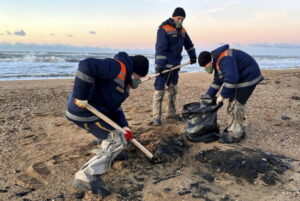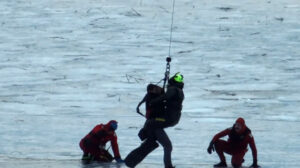Authorities installed by Moscow in the annexed Ukrainian peninsula of Crimea expressed fears today that massive quantities of fuel oil will reach the peninsula’s shores, as the oil spill caused by the sinking of two tankers on December 15 continues to spread in the sea, creating a large-scale ecological disaster.
“There is a serious risk that the situation will worsen, and the scale of the crisis could become comparable to that in the Russian region of Krasnodar,” said Sergei Aksyonov, the Moscow-appointed governor of Crimea.
On December 15, two Russian tankers, the Volgoneft-212 and Volgoneft-239, sank during a storm in the Kerch Strait. The ships were carrying 9,200 tons of fuel oil. According to the latest estimate by the Russian Ministry of Transport, released last week, 26% of the cargo spilled into the sea, causing widespread pollution that initially affected the shores of the Krasnodar region.
However, the oil spill later reached Crimea, primarily at the port of Sevastopol, located about 250 kilometers from the site of the disaster.

“The primary goal is to prevent petroleum products from reaching the shores [of Crimea] and to use all available resources to eliminate the pollution in the waters,” Aksyonov emphasized. He called for coordination of the efforts being carried out by small vessels currently deployed to tackle the pollution. Aksyonov also requested the continuation of “constant” aerial surveillance.
The official additionally mentioned the possibility of establishing a second center for the care of birds affected by the contamination and recovered in Crimea.
Numerous marine mammals were also found dead in Sevastopol, stated Pavel Kharlamov, a local deputy and leader of a volunteer group cleaning the beaches. Speaking to the Russian state news agency TASS, he said that “many” cetaceans were found dead and removed but did not specify their numbers or species.
More than 30 marine mammals were found dead in the sea after the mid-December sinking of two tankers in the Black Sea, announced a specialized non-governmental organization based in Sochi, southwestern Russia, on Sunday.
“We have recorded 61 dead marine mammals, 32 of which were discovered after December 15, with their deaths very likely linked to the oil spill,” reported the Russian NGO Delpha on Telegram, describing the number as “elevated.” “Almost daily, we receive information about new deaths,” the organization continued, specializing in rescuing dolphins and other cetaceans along Russia’s Black Sea coast. The NGO also noted, “most of the dead marine mammals are seals,” and based on the condition of the carcasses, it is “very likely that most of these animals died in the first ten days following the disaster.”
Yesterday, Tuesday, the Russian Ministry of Emergency Situations announced in an update that over 118,000 tons of contaminated sand have been removed from dozens of kilometers of beaches along Russia’s coast. However, a total of approximately 200,000 tons of soil may have been polluted.
In Crimea and Sevastopol, at least 287 tons of petroleum products have been removed since the beginning of cleanup operations, according to Russian authorities, who noted that more than 5,550 birds have been recovered and “rescued.”
For about three weeks now, Russian authorities and volunteers have organized a massive cleanup operation, but the situation remains concerning.
In December, scientists from the Russian Academy of Sciences criticized the authorities’ response to the environmental disaster, stating that the volunteers lacked the proper equipment to deal with such a catastrophe.
Last month, President Vladimir Putin acknowledged that the oil spill had caused an “ecological disaster,” and Kremlin spokesperson Dmitry Peskov stressed that the extent of environmental damage is “currently impossible to calculate.”
Ask me anything
Explore related questions





